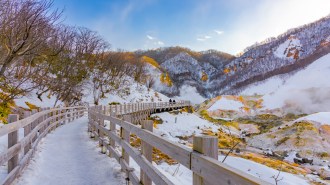Do Arctic diets protect prostates?
Prostate cancer’s prevalence and its increase with age tend to be consistent from country to country. A new study finds one major exception to this cancer’s high prevalence in older men: Arctic Inuit populations.
Assessments of cancer in Inuit groups in Alaska, Canada, and Greenland had hinted that prostate cancer’s incidence among the Inuit is unusually low. To rule out the possibility that the men had undiagnosed cancer, Eric Dewailly of Laval University in Sainte-Foy, Quebec, and his coworkers decided to examine prostates from a cross-section of male Greenlanders who died around 60 years of age from a range of causes, including cancer, heart disease, and violence.
The prostate from only 1 of 61 men appeared cancerous. Among 27 others examined more closely, just 10 showed any cellular abnormality, and none was cancerous, the researchers report in the September Cancer Epidemiology, Biomarkers & Prevention. Some 30 percent U.S. men, by contrast, have undiagnosed prostate cancer by age 60.
Several studies have pointed to selenium and omega-3 fatty acids, such as those in fish oil, as nutrients that might protect against prostate cancer. Owing to diets rich in fish and marine mammals, especially whales, Inuit men typically consume more of these nutrients than does any other population on Earth, Dewailly notes. Indeed, the lone prostate cancer that the researchers found was in a 73-year-old whose body fat contained only half of the omega-3 fatty acids concentration typical of the other Inuit men.
****************
If you have a comment on this article that you would like considered for publication in Science News, send it to editors@sciencenews.org. Please include your name and location.







